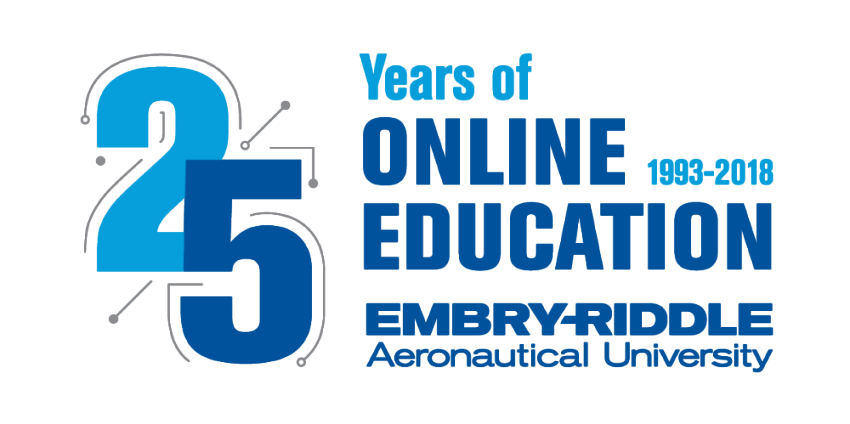Embry-Riddle Worldwide Marks 25 Years Leading Online Education - With No Signs of Slowing Down

Logging on to a computer or jumping on your mobile device to take a college course may not seem out of the ordinary now, but 25 years ago, Embry-Riddle’s Worldwide Campus invested in what it saw as the future for its students – online education.
According to Babson Survey Research Group’s 2018 report analyzing online education trends, there are more than six million online students in the United States – and those numbers are growing year over year at an accelerated rate.
The university’s evolution from one of the nation’s first distance learning providers nearly five decades ago to online education leader today started in 1971 with correspondence courses in which lessons and coursework were mailed back and forth between professors and students. As home computers were mass marketed in the 1980s, Embry-Riddle launched courses via audio tapes, followed by video classroom lectures, web-based bulletin boards and the first fully online classes in the 1990s.
In 2001, Embry-Riddle Worldwide cemented its commitment to online with the establishment of the Department of Distance Learning and the 2003 implementation of a learning management system.
As Embry-Riddle was laying the groundwork to transform the public’s and its own institution’s mindset from one of face-to-face, classroom learning to high-quality, accredited classroom experiences in the digital space, the university brought in an educator and administrator from a traditional residential campus who was passionate about e-learning and its future.
“When I arrived in 2006, there were online courses being offered, but the numbers compared to courses offered at our locations – primarily at military bases – were relatively low,” said Embry-Riddle Worldwide Chancellor Dr. John R. Watret. “While effective and valuable, they were still a form of passive learning. My vision was to make it interactive and incorporate the flexibility and convenience the market and industry were demanding.”
The first step for Watret was to invest in structural development such as redesigning courses, templates and platforms. These efforts laid the groundwork to develop a quality online asynchronous platform – the next level of learning that facilitates learning anytime, anywhere.
The next step was more difficult – getting faculty to buy in.
“It wasn’t easy, there were many heated debates – which there had to be. After all, faculty are the backbone of our students’ educational experience and success,” he said. “We selected key classroom, face-to-face faculty to develop and run courses online so they could personally experience the benefits of this format and get excited as they saw we were consistently getting awarded for the quality of the programs, and students were succeeding. Being able to tap into those faculty advocates has resulted in higher enthusiasm across the board.”
Building on staff support and student demand, Embry-Riddle Worldwide has gone from offering six degree programs online in 2006 to now offering 36. And currently, virtual enrollments account for nearly 89 percent of all of Embry-Riddle Worldwide, totaling more than 20,000 students.
For the past five years, Embry-Riddle Worldwide (online.erau.edu) has been the only private, not-for-profit institute out of hundreds of universities nationwide ranked in the Top 5 of U.S. News & World Report’s annual list for best online bachelor’s degrees. It also has earned numerous accolades including being named one of the best online colleges in the nation by the Center for Online Education, multiple top nods for its online master’s and bachelor’s degrees in engineering programs from independent online ranking providers as well as being designated a top military-friendly school by Victory Media.
One of the keys to the success of Embry-Riddle Worldwide’s online programs is an institutional commitment to provide the most advanced technology including virtual labs, interactive simulation platforms and artificial intelligence.
Some of those innovations include the Virtual Crash Lab launched in May 2014 in which students are able to examine aircraft accident scenes, document evidence and even interview survivors – all through their computer. In January 2016, Embry-Riddle Worldwide debuted the Virtual Aerial Robotics Lab where students can build their own Unmanned Aerial Systems (UAS), aka drones, test flight capability and analyze the results from anywhere.
“Looking back, we certainly have set the standard for online higher education and have become a model for other universities to replicate,” said Dr. Jason M. Ruckert, Embry-Riddle Worldwide’s Vice Chancellor for Online Education. “As we move forward, we will continue to distinguish ourselves as a global leader by embracing innovative and agile technology with cutting-edge delivery platforms to enhance our diverse degree program offerings while also bringing traditionally residential campus degree programs with high demand online, including engineering, cybersecurity, unmanned flight, aviation maintenance and more.”
As online education continues to evolve, so will Embry-Riddle Worldwide.
“If you were to ask me what will happen in the next 25 years, I’d say it’s going to be amazing,” said Watret. “What we’re doing now with blended classes, giving students even more options and diversity of programs, providing residential students the opportunity to earn degrees online and in-class, redesigning courses and delivery platforms tailored to students’ needs – there are endless possibilities. And we will continue to be the best.”
